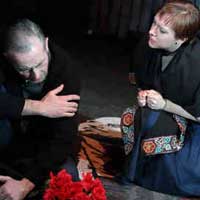
[rating=2] “Dolly Llama” [rating=4]”Orion’s Belt”
 As the cast of “My Brother’s Keeper” took the stage in the basement of Saint Bonaventure’s church on September 11th, 2015 in Chicago, they could not have helped but been nervous. Subtext Theatre Company is as new as can be to Chicago (a city dubbed “the Theatre capital the world” by The Guardian: an important English newspaper), and this was opening night of the company’s very first production. Although billed under the name “Brother’s Keeper,” this two-act play is actually two separate one-act pieces entitled “Dolly Llama” and “Orion’s Belt,” and the playwright, director, and actors struggle to create a high degree of unity between them. Nonetheless, there is plenty to be gleaned from, enjoyed, and haunted by, particularly in “Orion’s Belt,” as siblings try and cope with brothers who cannot navigate the world, especially when their mothers are removed by death or exhaustion. Overall, this production of family dramas signals the promising beginning of a fledgling theatre company.
As the cast of “My Brother’s Keeper” took the stage in the basement of Saint Bonaventure’s church on September 11th, 2015 in Chicago, they could not have helped but been nervous. Subtext Theatre Company is as new as can be to Chicago (a city dubbed “the Theatre capital the world” by The Guardian: an important English newspaper), and this was opening night of the company’s very first production. Although billed under the name “Brother’s Keeper,” this two-act play is actually two separate one-act pieces entitled “Dolly Llama” and “Orion’s Belt,” and the playwright, director, and actors struggle to create a high degree of unity between them. Nonetheless, there is plenty to be gleaned from, enjoyed, and haunted by, particularly in “Orion’s Belt,” as siblings try and cope with brothers who cannot navigate the world, especially when their mothers are removed by death or exhaustion. Overall, this production of family dramas signals the promising beginning of a fledgling theatre company.
Because epigrams are easily missed in theatre productions, I advise patrons to look through the program before the play begins for some gorgeous lines that the playwright has included from a poem by Mary Gauthier’s which begins “my brother could use a little mercy now/he is a stranger to freedom…” and that seem to fit the second play “Orion’s Belt,” a great deal more than “Dolly Llama.” For although both plays were written by Leigh Johnson, directed by John Oster, and involve a mother who can never quite see how bad their grown-up son’s pathology has become, in substance; character; plot; length; tone; mood; and to a certain extent quality, they could not be more different.
The first, “Dolly Llama,” focuses on an adult brother and sister, Wanda (Kristin Broadwell) and Jess (Jonathan “Rocky” Hagloch), in rural IL as they try and decide how to stop their late mother’s favorite child, Travis: a man with serious problems surrounding addiction; dependency; crime; and deception, from improperly disposing of her ashes. While this sounds like a serious dilemma, the play’s mood is consistently light, comic, and playful (perhaps due to Oster’s understated direction as well as Johnson’s script). Most of the dialogue consists of humorous reminiscences and jokes, and its ending is all too predictable.
Moreover, although Broadwell and Hagloch are clearly gifted actors (Broadwell skillfully executes playful, intelligent, knowing, concerned, and convincing facial expressions consistently throughout the play, and Hagloch is capable of adroitly speaking lines in conjunction with appropriate physical gestures to produce a warm humor), they struggled at the level of delivery through what I am sure were the very bad acoustics of the church basement so that their lines were frequently hard to hear and sometimes poorly delivered. Likewise, the blocking seemed stilted and badly executed. Consequently, towards the end of the play, when Broadwell spoke about (her character) Wanda’s own children and whether or not she had favorites, she couldn’t deliver the dialogue with enough melancholy, reflection, realism and depth to create a link between the end of “Dolly Llama” and “Orion’s Belt’s” final scene.
However, in some ways, even the shortcomings of this light, brief, forty-minute piece serve as a warm up to “Orion’s Belt” which runs for an hour-and-forty-minutes, and would, by itself, be worth the full price of admission. Set in “deep winter” in Burlington, Wisconsin, this play, although extremely funny, is beset by so much tragedy, gravity, frustration, and pain that to call it a tragicomedy would be inaccurate so that Polonius’s category of “comical-tragical” is the only designation that seems to fit.
It concerns a young nuclear scientist, Paul (Michael Dritto), who returns home from the power plant in another town at which he works to find that his mother, Doris (Renae Stone) has not been adequately caring for his socially disabled and emotionally disturbed brother, Kyle (Nathan Wainwright), who is beginning to show signs of an increasingly distorted, and dangerous, view of reality. Instead, she has been feeding him his favorite dish every night (a monotonous and unhealthy diet which can hardly be helping his tenuous grasp of reality), allowing him three glasses of mountain dew a day (not a good choice for someone ridden with both nervous energy and agoraphobia), and letting him get lost in a video game in which you drive around and get points for killing people, not to mention letting him drive her car—I don’t really think this needs parentheticals. Kyle talks about the bad people who he doesn’t want to be part of his life, and in one particularly disturbing exchange, asks Paul if he knows how to produce a nuclear explosion.
As Paul spends the night with Kyle while his mother travels to Madison to visit her sister, he gets closer to his brother. In doing so, he reflects on their relatively happy life as children, their hobby of star-gazing, their parent’s divorce, his own failures in high school as a brother, and searches for a solutions to Paul’s dysfunction as it becomes increasingly clear through a number of telephone conversations with his mother that she is utterly incapable of acknowledging that there is something very wrong, and of taking steps to address it. In fact, she is so deluded that she refers to herself as “a tiger-mom,” although she admittedly has misunderstood the term. Paul’s determination to find a solution to his brother’s pathology and his mother’s neglect leads to the plays shocking but quiet conclusion in which slow but drastic action are combined with a moving, melancholic, monologue to produce a chilling effect.
Dritto is intelligent and increasingly frustrated as Paul, mixing humor with an ever deeper horror, and a tinge of shame and regret, as he discovers what has been going on since he left home, and a simultaneous numbness and warmth for Paul’s soliloquy in the play’s final scene which haunted me hours after I left the theatre. Wainwright is full of nervous energy as Kyle, and conveys a sense of someone who is not only disabled, but has been harmed: first by his father leaving and then by his Mom’s increasing inability to cope, and refusal to try and integrate him in any way into society or get him psychiatric help. Kyle’s mother, Doris, is the least dynamic of any of the characters so it would be easy to see Stone’s consistent, comic, performance as caricature. However, she infuses just enough nuance so that any illusion of caricature or gestures instead become the automated responses and personality of a very real woman to living in situation with which she can no longer cope, leading her to ever higher degrees of denial and maladjustment.
The blocking, lighting, and set (Vern Cholagh) likewise seemed stronger in the second play which aside from the backdrop, clearly designed for the longer, stronger, piece, is confusing as both pieces were directed and presumably lighted by the same people. Perhaps the heavy plot of “Orion’s Belt” called from more sophisticated lighting design (John Galt) and meaningful movement, and it certainly was that. The lighting, and scenic design produced winter, night, and, when two characters on the stage spoke over the telephone: remoteness. In this, the design was assisted by gifted blocking that consistently sustain beauty and artistry as the characters are forced to move to the play’s tragic conclusion.
“Brother’s Keeper” is being produced by the “Subtext Theatre Company” in the basement of Saint Bonaventure’s Church located at 1625 W. Diversey, at Marshfield just south of Ashland, in Chicago. It runs through October 4, 2015th with performances Thursday through Saturday at 8:00 and Sunday at 4:00. Regular tickets are $25 dollars and can be purchased through paypal at http://www.subtextnfp.org/box-office.html Two Free Parking lots are available. The plays vary in quality, but each will see what they want to see.
To see what others are saying, visit www.theatreinchicago.com, go to Review Round-up and click at “Brother’s Keeper”






More Stories
“The Secret Garden”
“Yippee Ki Yay” The Parody of Die Hard reviewed by Frank Meccia
“Throbbin Wood” reviewed by Julia W. Rath